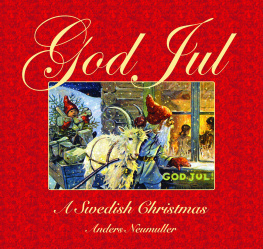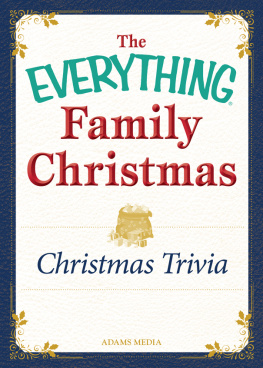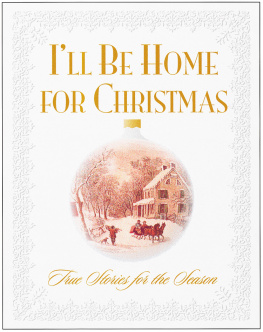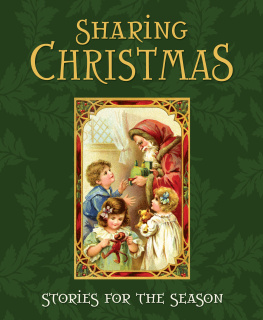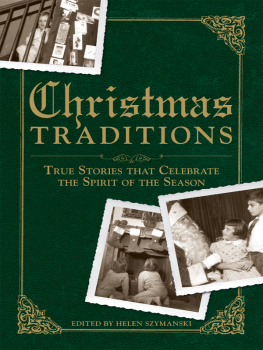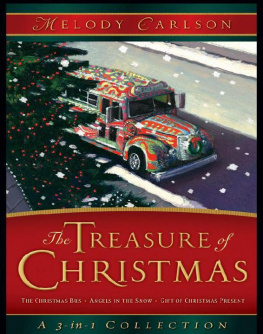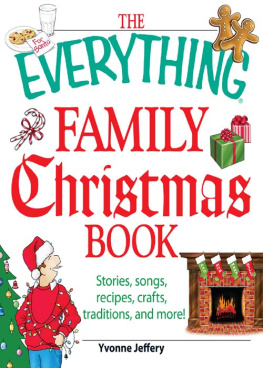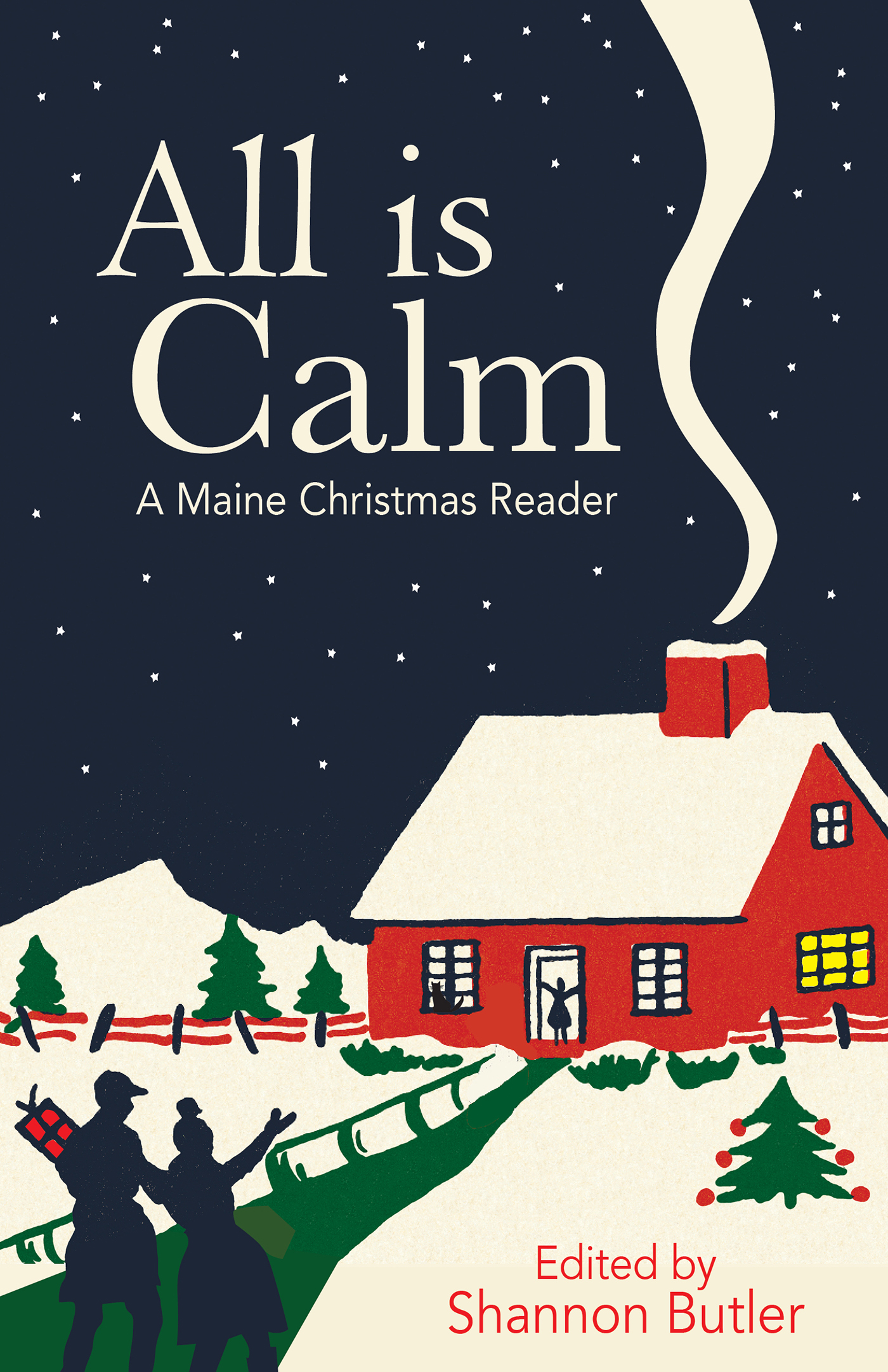
All Is Calm
A Maine Christmas Reader
Edited by Shannon Butler

Other Books From Islandport Press:
Shoutin Into The Fog
By Thomas Hanna
The Cows Are Out!
Trudy Chambers Price
Nine Mile Bridge
Helen Hamlin
Whatever It Takes
May Davidson
In Maine
By John N. Cole
Old Maine Woman
Glenna Johnson Smith
My Life in The Maine Woods
Annette Jackson
Christmas in Maine
Robert P. Tristram Coffin
These and other Maine books available at:
www.islandportpress.com
Islandport Press
PO Box 10
Yarmouth, Maine 04096
www.islandportpress.com
info@islandportpress.com
Copyright Islandport Press 2019
All rights reserved.
First Islandport Printing, 2019
eISBN: 978-1-944762-87-2
Library of Congress Card Number: 2019931597
Printed in USA.
Dean L. Lunt, Publisher
Book design, Teresa Lagrange
Christmas in a One-Room Schoolhouse, May B. Davidson, 2019
An Island Celebration, Dean L. Lunt, 2019
Christmas Eve at the Chinese Buffet, Maureen Walsh
Snowflakes of Christmas, Tristan Noyes, 2019
Unwrapping, Shawn Callahan, 2019
For all other permissions, please see bibliography.
What happens to me when I cross the Piscataqua and plunge rapidly into MaineI cannot describe it. I do not ordinarily spy a partridge in a pear tree, or three French hens, but I do have the sensation of having received a gift from a true love.
E.B. White
Contents
Editors Note
I often joke that the Maine state motto should be progress without change. We Mainers like things the way we like them, and if progress must be made to adapt to the inevitable shifts of time, then we will always try our hardest to make sure necessary changes are minimal. The merit (or lack thereof) in having this mentality can be argued endlessly. But for better or worse, it is this attitude that has kept Maine traditions, Maine landscapes, and the Maine way of life more or less intact.
Through the process of collecting the stories of Mainers at Christmastime. I have come to realize that over the nearly two centuries the holiday has been celebrated in our fair state, we have made significant progress. Our homes are now heated and plumbed. Our Christmas dinner can be fetched at Hannaford rather than in the woods or waters. There are lights in every room to fend off the darkness that creeps in around three in the afternoon, and studded snow tires make winter travel nearly effortless.
But with this progress, has anything changed? In researching our Christmas history, it also seems obvious that for two hundred years, the month of December has resisted most modification. Our quality of life has increased, winter is no longer as difficult and perilous as it once was, but our traditions in the twelfth month have largely remained the same. Christmas trees are still cut by hand. Children still anxiously await Santa, fitfully listening for the first sign of stirring under the tree, the same as they have for decades. We decorate our homes, and prepare recipes handed down from generations past. We light woodstoves and fireplaces, sing carols, and invite neighbors and friends to share in good cheer.
Perhaps being so tied to our landscape has helped us cling to our traditions. Its hard to accept that time is progressing when the trees, the ocean, and the mountains are steadfast. The bright stars that shine in the black, freezing night air over my grandmothers barn are the same ones my mom stared up at as a girl and the same ones my great-grandparents looked at when they crossed the snowy dooryard to tend the horses on subzero nights.
Maybe our resistance to change has come from the deep roots of community. Maine feels more like an oversized village than a state made of individual counties and municipalities. Everyone here is a cousin of someone, who is the former neighbor of someone else, who was the best friend of someone else. No Mainer is separated from another by more than a few degrees, and rarely does this show more than at Christmas. Each December, our Maine community rallies around those who are hungry, or cold, jobless, or simply without a new toy. Parties at homes, offices, and churches overflow with good cheer and neighborly affection.
Its easy to poke fun at Mainers for their stubborn nature and resistance to change, but why would we ever want to change? With abounding natural beauty, and our village of a million citizens, why would we ever feel the need to bend to the whims of time? We allow only the progress necessary to continue in this modern world but concede none of the traditions that make up our essence.
I have spent every Christmas of my life in Maine. So have my parents. So have my grandparents and so goes the family lineage about as far back as one can trace. My ancestors clearly saw the advantages and value of being in Maine long before I was born. Perhaps long enough ago that Maine is now woven into our shared DNA. Perhaps this is why I have no doubts that I will continue spending every Christmas here, surrounded by piles of snow and endless evergreens.
Even if Maine is not in my DNA, all I need to see is the vast blanket of stars over the fields on Route One north of Houlton to know that change is out of the question. If I were to change Christmas in Maine I would in turn be changing the intangible piece of myself that grounds me in a world that often feels as though its spinning off course. Christmas in Maine is far more than the warmth of a wood fire or the sweet tang of ciderits a shared knowledge of tradition, and community, and our natural world. The shared knowledge of that which will never change despite progress.
Merry Christmas,
Shannon Butler
Kennebunk, Maine
November 2019
Introduction
A Holiday History
Maine has become the picture-perfect, snow-globe setting for a host of Christmas imagery. From idyllic, pastoral scenes on holiday cards to romantic backdrops for blossoming love in Hallmark movies, these idealized images give the notion that Maine has always been the setting for a perfect Christmas. But, the reality of biting cold, icy seas, and heavy snow actually made for a rocky start to Christmas celebrations in the northern tip of New England.
Its alleged that Maine hosted the first celebration of Christmas in the New World in 1604 (three years before the Popham Colonys known holiday ceremony) when a French fur trading ship landed on St. Croix Island, located off Calais in Passamaquoddy Bay. This little island offered the protection of being surrounded by water while the nearby mainland provided fertile farmland, bountiful game to hunt, and abundant lumber. The sailors were confident they had found the ideal place for a new settlement. Eager to establish new territory in the name of France, the men quickly began building homes and a church. To make their settlement permanent they needed more supplies. In October, fifty crew members set sail back to France while seventy men remained on St. Croix Island.
Not long after the ship had left for France, the autumn weather turned sharp and savage. Early snowstorms shocked the men who were used to mild French winters, and the river and bay that surrounded their small island became clogged with fast-moving ice jams, making crossing to the mainland impossible. The crew was stranded on a frozen island with little food, no drinking water, and very little firewood.


